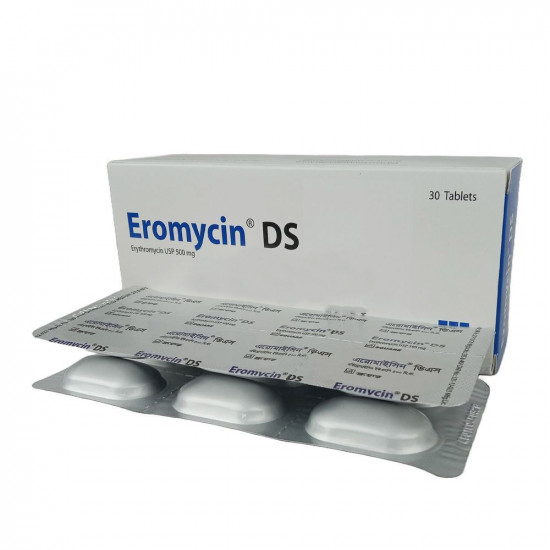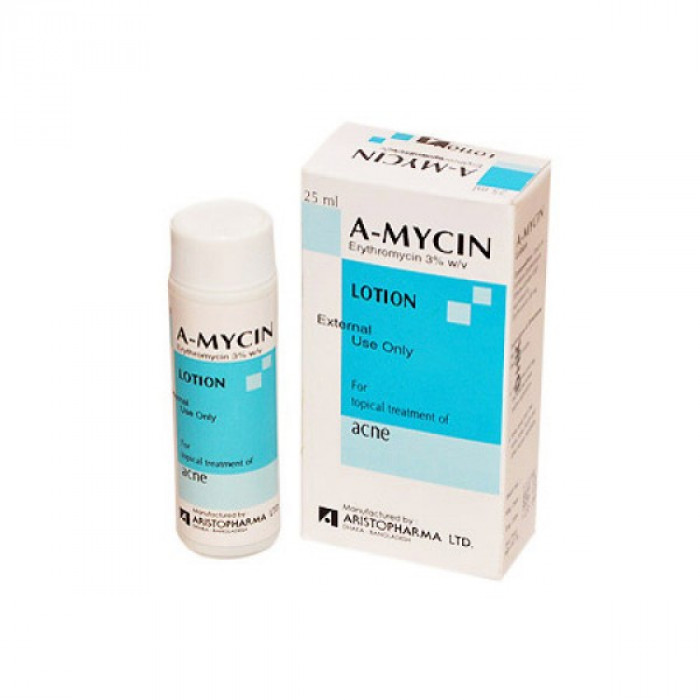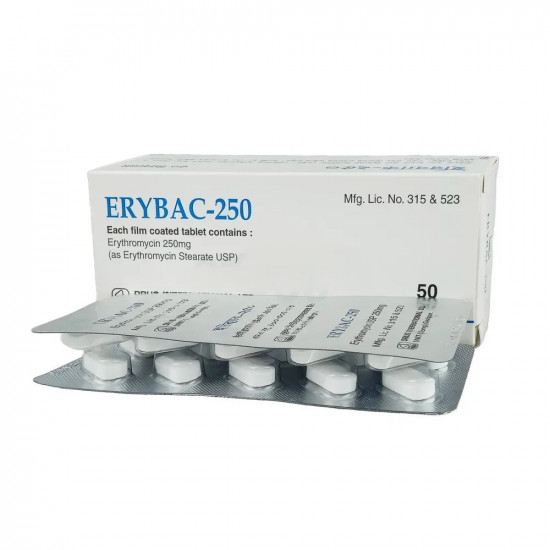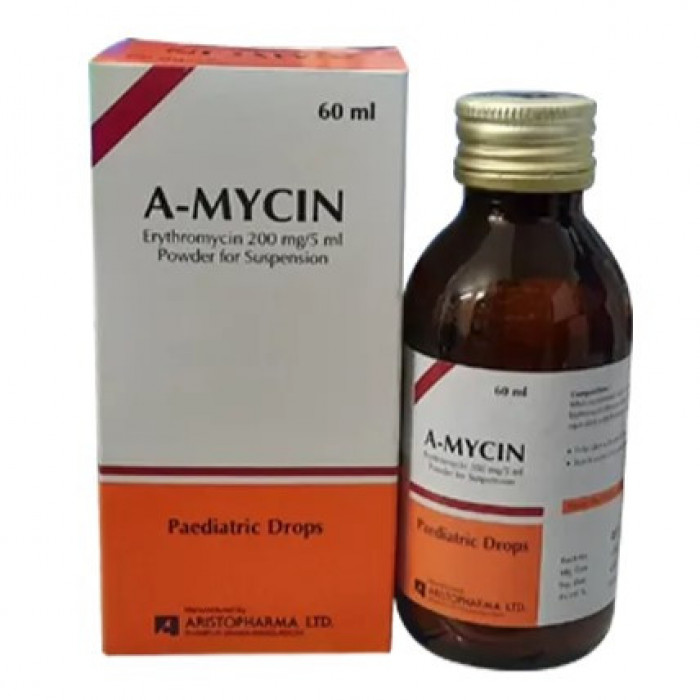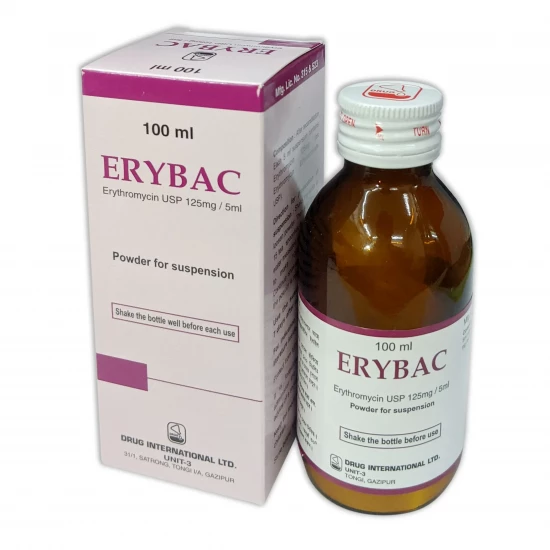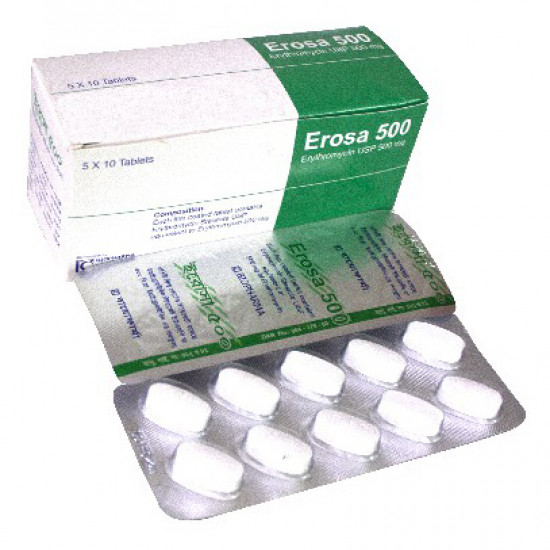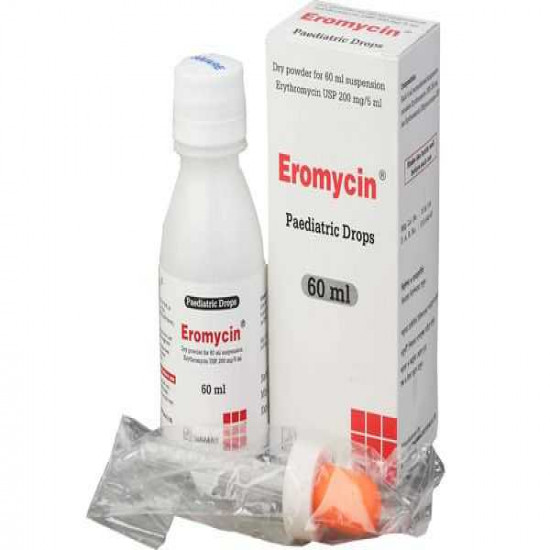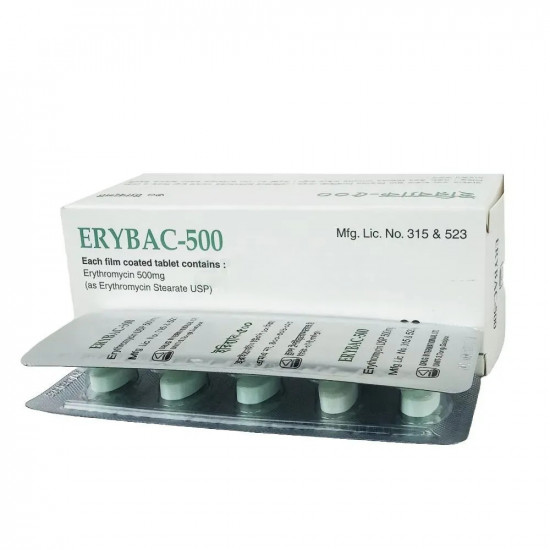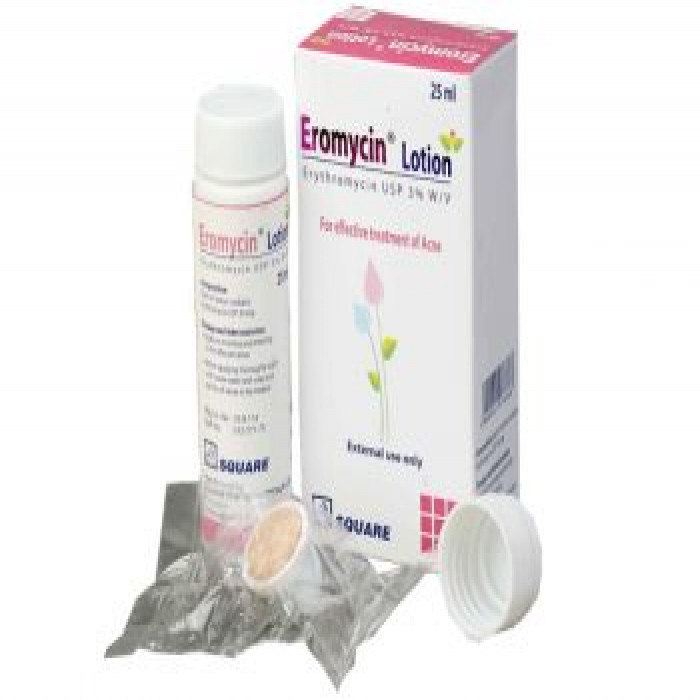
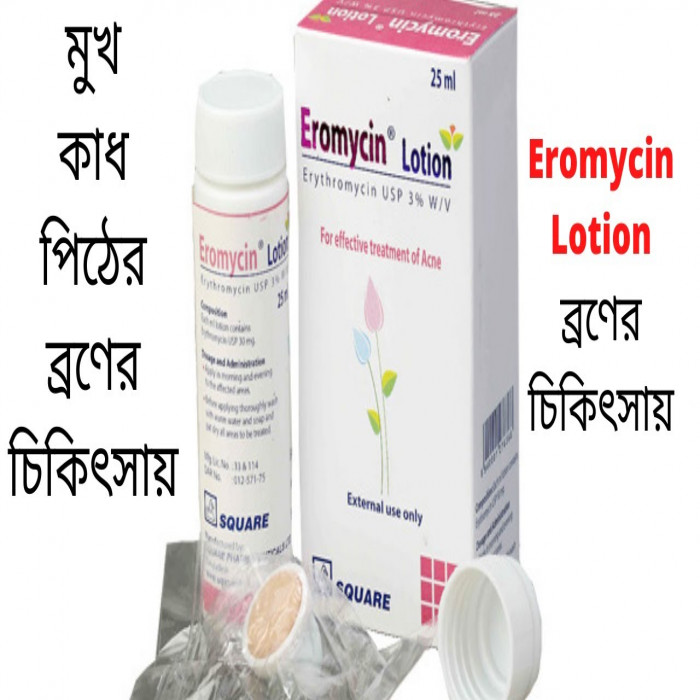
✔ 100% Authentic Product
👁️ Currently Viewing 5840
Eromycin 3% Lotion is used to treat acne. It helps to reduce the number of pimples. Erythromycin is an antibiotic (macrolide-type). It works by stopping the growth of bacteria.
Discount
Price: ৳ 114
MRP:
৳
121
6%
Off

100% Genuine Products, Guaranteed

Safe & Secure Payments, Always

Fast, Secure & Efficient Delivery

Proper Packaging
 Cash on Delivery - All over Bangladesh
Cash on Delivery - All over Bangladesh Regular Delivery - 12-24 Hours, Dhaka City* Charge Tk.39-59
Regular Delivery - 12-24 Hours, Dhaka City* Charge Tk.39-59 Regular Delivery - 24-48 Hours, Other Cities* Charge Tk.99-110
Regular Delivery - 24-48 Hours, Other Cities* Charge Tk.99-110
 ফ্রি ডেলিভারিঃ - ৯৯৯ টাকা+ অর্ডারে, ঢাকা
শহরে
ফ্রি ডেলিভারিঃ - ৯৯৯ টাকা+ অর্ডারে, ঢাকা
শহরে ফ্রি ডেলিভারিঃ - ২৯৯৯ টাকা+ অর্ডারে, ঢাকার
বাহিরে
ফ্রি ডেলিভারিঃ - ২৯৯৯ টাকা+ অর্ডারে, ঢাকার
বাহিরে
100% Genuine Products, Guaranteed
Safe & Secure Payments, Always
Fast, Secure & Efficient Delivery
Proper Packaging
 Cash on Delivery - All over Bangladesh
Cash on Delivery - All over Bangladesh Regular Delivery - 12-24 Hours, Dhaka City* Charge Tk.39-59
Regular Delivery - 12-24 Hours, Dhaka City* Charge Tk.39-59 Regular Delivery - 24-48 Hours, Other Cities* Charge Tk.99-110
Regular Delivery - 24-48 Hours, Other Cities* Charge Tk.99-110 ফ্রি ডেলিভারিঃ - ৯৯৯ টাকা+ অর্ডারে, ঢাকা
শহরে
ফ্রি ডেলিভারিঃ - ৯৯৯ টাকা+ অর্ডারে, ঢাকা
শহরে ফ্রি ডেলিভারিঃ - ২৯৯৯ টাকা+ অর্ডারে, ঢাকার
বাহিরে
ফ্রি ডেলিভারিঃ - ২৯৯৯ টাকা+ অর্ডারে, ঢাকার
বাহিরে
✅ Description:
Eromycin 3% Lotion is an antibiotic specifically designed to treat acne and bacterial skin infections. It works by inhibiting the growth of bacteria, leading to a reduction in the number of pimples and an improvement in symptoms.
This cream is intended for external use only and should be applied solely to the affected area of the skin according to your doctor's prescribed dosage and schedule. To derive the maximum benefit, apply it regularly at a consistent time each day. Avoid using larger amounts or applying it more frequently or for a longer duration than instructed, as this can increase the risk of side effects. It may take a while before you start noticing improvements in your acne, so it's important to be patient and continue using the cream daily.
Eromycin 3% Lotion is generally safe to use, with minimal side effects such as skin peeling, redness, dryness, irritation, itching, stinging, and a burning sensation. If any of these side effects persist or if your condition does not improve, consult your doctor for further guidance.
Ensure that the cream does not come into contact with your eyes, nose, or mouth. If accidental contact occurs, rinse thoroughly with water. Before using Eromycin 3% Lotion, inform your doctor about any history of allergies to this or any other medication. Pregnant or breastfeeding women should consult their doctor before using this cream to assess any potential risks.
Safety Advices

Alcohol
No interaction found/established

Pregnancy
CONSULT YOUR DOCTOR
Eromycin 3% Lotion should be used during pregnancy only if considered necessary. Consult your doctor before taking Eromycin 3% Lotion.

Breastfeeding
CONSULT YOUR DOCTOR
Eromycin 3% Lotion should be used with caution in breastfeeding women. Consult your doctor before taking Eromycin 3% Lotion.

Driving
No interaction found/established

Kidney
No interaction found/established

Liver
No interaction found/established
✔️ Uses of Eromycin 3% Lotion
- Acne
- Treatment of Bacterial infections
✔️ How does Eromycin 3% Lotion work?
Eromycin is an antibiotic that stops the growth of acne-causing bacteria on the skin. It does so by preventing the synthesis of essential proteins required by these bacteria to carry out vital functions.
✔️ Side effects of Eromycin 3% Lotion
- Dry or scaly skin
- irritation
- itching
- Peeling
- redness
✔️ Quick Suggestions:
- You have been prescribed Eromycin 3% Lotion for the treatment of severe acne.
- You may have to use it for a long time before your acne starts to improve. Be patient and keep using it every day.
- Apply it as a thin layer on to clean, dry, unbroken skin affected by acne.
- Wash your skin with a mild cleanser and pat it dry before applying Eromycin.
- It may cause minor burning, stinging, or irritation when applied. Inform your doctor if this does not go away.
- Avoid contact with your eyes, nose, or mouth. Rinse it off with water if you accidentally get the cream in these areas.
- If you think the area of skin you are treating has become more irritated and infected, you should stop using Eromycin and consult your doctor.
✔️ Indication
Erythromycin belongs to the family of medicines called antibiotics. Erythromycin topical preparations are used on the skin to help control acne. They may be used alone or with one or more other medicines that are applied to the skin or taken by mouth for acne. They may also be used for other problems, such as skin infections, as determined by your doctor.
✔️ Pharmacology
Erythromycin inhibits the synthesis of proteins in susceptible organisms by blocking the translocation process. It specifically binds to the 50S subunit or 70S ribosome in these organisms but does not bind to the normal 80S ribosome found in mammals. Erythromycin is effective against many Gram-positive bacteria, some Gram-negative bacteria, as well as mycoplasmas and chlamydia.
When taken orally, erythromycin base is destroyed by stomach acid, so it is administered in the form of stable esters. The absorption rates of the base and esters are reduced when taken with food. The stearate form is hydrolyzed in the intestines, releasing free erythromycin for absorption.
✔️ Dosage & Administration of Eromycin 3% Lotion
Clean the affected area with warm water and soap, rinse thoroughly, and gently dry it.
For Acne:
- Gel Formulation:
- Adults: Apply twice daily (morning and evening).
- Children: Dose determined by a doctor.
- Ointment Formulation:
- Adults, Teenagers, and Children: Apply twice daily (morning and evening).
This medication will not cure acne but will help control it. Continue using the medication for the full duration prescribed, even if symptoms improve. Do not miss doses as it may cause symptoms to return.
✔️ Interaction
- Rhabdomyolysis with or without renal impairment with HMG-CoA reductase inhibitors (e.g., simvastatin): Erythromycin can increase the risk of muscle breakdown (rhabdomyolysis) when used with certain cholesterol-lowering medications like simvastatin.
- Increased risk of colchicine toxicity: Concurrent use of erythromycin and colchicine can increase the risk of colchicine toxicity, which can lead to severe side effects.
- Increased sedation with triazolobenzodiazepines and related benzodiazepines (e.g., alprazolam, midazolam): Erythromycin can enhance the sedative effects of certain benzodiazepines, leading to increased drowsiness or sedation.
- Theophylline may decrease and cimetidine may increase erythromycin concentration: Theophylline, a medication used to treat respiratory conditions, may have reduced levels when used concurrently with erythromycin. On the other hand, cimetidine, a medication used for acid reflux, may increase the concentration of erythromycin in the body.
- Hypotension, bradyarrhythmia, and lactic acidosis with calcium channel blockers (e.g., verapamil, amlodipine, diltiazem): Concurrent use of erythromycin with calcium channel blockers can increase the risk of low blood pressure, slow heart rate, and lactic acid buildup.
- Increased systemic exposure to sildenafil: Erythromycin can increase the levels of sildenafil, a medication used for erectile dysfunction, potentially leading to increased side effects.
- Increased or prolonged adverse effects with ciclosporin, carbamazepine, tacrolimus, alfentanil, disopyramide, rifabutin, quinidine, methylprednisolone, cilostazol, vinblastine, and bromocriptine: Erythromycin can interact with these medications, leading to increased or prolonged effects or potentially higher risk of toxicity.
- Increased risk of digoxin toxicity: Erythromycin can increase the levels of digoxin, a medication used for heart conditions, potentially leading to an increased risk of digoxin toxicity.
- Increased bleeding with oral anticoagulants: Erythromycin can enhance the effects of oral anticoagulants, increasing the risk of bleeding.
- Potentially fatal cardiac effects with cisapride, pimozide, astemizole, or terfenadine: Erythromycin can prolong the QT interval and increase the risk of serious cardiac arrhythmias when used with these medications.
- Acute ergot toxicity with ergotamine and dihydroergotamine: Concurrent use of erythromycin with ergotamine derivatives can increase the risk of acute ergot toxicity, which can lead to severe and potentially life-threatening effects.
✔️ Contraindications
Erythromycin should not be used in individuals with known hypersensitivity (allergic reaction) to the medication. It is also contraindicated in individuals with porphyria, a group of rare genetic disorders that affect the production of heme, a component of hemoglobin. Erythromycin should be used with caution or avoided in patients with hepatic impairment (liver dysfunction) as the medication is metabolized in the liver.
Regarding pregnancy, erythromycin is generally considered safe for use during pregnancy. However, it is always important to consult with a healthcare professional before taking any medication during pregnancy to assess the potential risks and benefits.
✔️ Pregnancy & Lactation
Clinical and Laboratory studies have been shown no evidence in human of teratogenicity or toxicity. However, caution should be exercised when prescribing this drug to pregnant patients and lactating mothers since erythromycin crosses the placental barrier and is excreted in breast milk.
✔️ Precautions & Warnings
If your acne does not show improvement within 3 to 4 weeks or if it worsens, it is important to consult your healthcare professional. Keep in mind that acne treatment may take 8 to 12 weeks before significant improvement is seen.
For individuals using the swab, gel, or liquid form of erythromycin:
If your doctor has prescribed another medication to be applied to the skin in conjunction with erythromycin, it is advisable to wait at least 1 hour before applying the second medication. This can help prevent excessive skin irritation. Additionally, using the medications too close together may interfere with their effectiveness.
After applying this medication to the skin, mild stinging or burning sensations may occur and can last for a few minutes or longer.
This medication may cause the skin to become unusually dry, even with regular use. If this occurs, consult your doctor for further guidance.
You may continue to use cosmetics (make-up) while using this acne medication. However, it is recommended to choose "water-based" cosmetics and avoid heavy or frequent application. Excessive use of cosmetics can potentially exacerbate acne. If you have any concerns or questions regarding the use of cosmetics, consult your doctor for advice.
✔️ Storage Conditions
- Store the medicine in a closed container at room temperature, away from heat, moisture, and direct light. Keep from freezing.
- Keep out of the reach of children.
- Do not keep outdated medicine or medicine no longer needed.
⚠️Disclaimer:
At ePharma, we’re committed to providing accurate and accessible health information. However, all content is intended for informational purposes only and should not replace medical advice from a qualified physician. Please consult your healthcare provider for personalized guidance. We aim to support, not substitute, the doctor-patient relationship.




